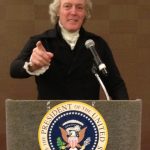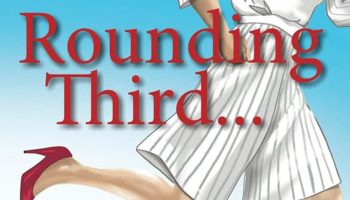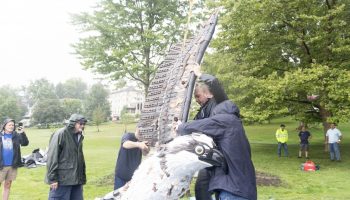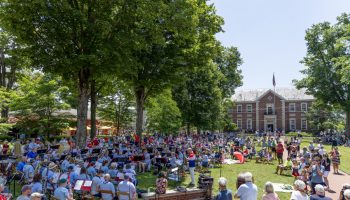Thomas Jefferson is coming to town.
More precisely: the model for the Jefferson statues in the state of Virginia’s capitol building and the library at West Point, and for Jefferson’s image
in videos shown at Monticello and the Jefferson Memorial in Washington, D.C., is returning to Chautauqua.
The reincarnation of Jefferson seen in myriad magazines and in television programs is back to perform. During recent seasons, he has come on his own (keeping to himself at the Athenaeum Hotel and elsewhere) because “Chautauqua is a national treasure” and “the last bastion of the Jeffersonian ideal,” where people converse about civil liberties and freedom of expression.

At 2 p.m. Saturday, July 14, in the Hall of Philosophy, as part of the Chautauqua Women’s Club’s Contemporary Issues Forum, professional interpreter Bill Barker will morph into Colonial Williamsburg’s most important character and one of America’s greatest political philosophers. He will tell “The Story of the Declaration of American Independence” from Jefferson’s point of view.
Year-round in Colonial Williamsburg, where historical authenticity and theater are combined to educate, entertain and expand the minds of present-day visitors, famous and obscure Virginians of the 17th and 18th centuries come to life.
In settings that engage all of one’s senses, Barker and other character-interpreters wear Colonial garb and discuss everyday challenges and weighty events, including the transformative ideas, experiments, processes and documents that shaped American independence and nation-building.
“That the future may learn from the past,” is the Colonial Williamsburg Foundation’s motto.
Barker not only resembles the third president of the United States and founder of the University of Virginia — he has the same height, weight and general appearance — but he also has the academic background and theatrical experience to credibly assume Jefferson’s persona.
“I was a history major, but I couldn’t stay off the stage,” Barker said.
After graduating from Villanova University, Barker said he became a professional actor, theater director and producer in Philadelphia and Washington, D.C. For 11 years, he served as the artistic director of the world’s oldest continually producing Gilbert and Sullivan troupe, Philadelphia’s Savoy Opera Company.
“A friend portrayed — moonlighted — as William Penn in ‘Pennsylvania History,’” Barker said. “He came up to me and said, ‘Did anyone tell you that you look like Thomas Jefferson?’ ”
As it turned out, his Penn friend knew of photo opportunities at Independence Hall. He suggested Barker go there and told him that the set was real, not paper mache, so he needed to learn about Jefferson.
“He was right,” Barker said. “You have to know about Jefferson.”
During the past 37 years — the first 12 at Independence Hall, the next 25 and counting at Colonial Williamsburg — Barker has demonstrated his keen knowledge of Jefferson day in and day out, including Jefferson’s Southern accent, mannerisms, intellect, beliefs and numerous accomplishments.
“So much of what happened in Philadelphia had happened in Williamsburg,” he said.
Barker said that “every single day” he performs Jefferson.
“I’ve been all over the country, including to Alaska, and to England, France and Italy,” he said. “I have walked where he walked.”
Among the many venues in which Barker has performed are the Palace of Versailles, National Museum of the Legion of Honor in France and the White House. He said that while traveling in the United States, he feels “the political whims across the country.”
“I grew up in Philadelphia. It’s a pretty tolerant city,” Barker said. “This has given me an extraordinary sense of what Thomas Jefferson experienced. I find him more and more relevant, particularly over these last years, especially with the election of an African-American president.”
Barker said that six years before he wrote the Declaration of Independence, Jefferson unsuccessfully defended a slave, Sam Howell, pro bono in the 1770 Virginia case, Howell v. Netherland.
“(Jefferson) said that everyone is born free,” Barker said. “He is in nature free. It is the laws of man that have shackled him. … In his summation statement … he said slavery is not legal in the United States because the contract was drawn up in Africa. This was an extraordinary case.”
Seventy-one years later in the case United States v. Schooner Amistad — which the 1997 film “Amistad” made famous — former President John Quincy Adams successfully used Jefferson’s argument before the U.S. Supreme Court on behalf of a group of West Africans abducted from Sierra Leone by Portuguese slave hunters and shipped to Cuba.
“John Quincy Adams knew Jefferson,” Barker said. “He turned Massachusetts to Jefferson and in 1824 won the presidency. … He was in the House of Representatives in the 1840s when Abraham Lincoln was there. Lincoln’s hero, Henry Clay, read law when Jefferson did. Wonderful germs pass from generation to generation.”
Having reenacted Jefferson in communities that are part of the Chautauqua Trail, Barker said that he first came to Chautauqua Institution in 2008.
“Although other Chautauquas welcomed costumed presenters, that was the thing that the real Chautauqua did not do,” he said.
According to Barker, former Chautauqua Director of Religion Joan Brown Campbell was drawn to the conversations between nation-builders at Colonial Williamsburg and the differences of opinion expressed at the time — especially by women and African-Americans. She and former Colonial Williamsburg Foundation President and CEO Colin Campbell (no relation) “had to convince the powers that be that historical enactment was a viable way of presenting history,” Barker said.
During their first visit, Barker said, he and Colin Campbell were sitting on the front porch of the Hagen-Wensley House, “and he told me, ‘It’s all up to you.’ ”
All went well, and for several years, Chautauqua partnered with the Colonial Williamsburg Foundation.
In August 2011, Barker portrayed Jefferson in the Hall of Philosophy in “Storm on the Horizon” during the afternoon and in the Amphitheater in “A Wolf by the Ear” during the evening. Among many other things, he said then that power should be in the hands of people at all levels of government, and that bills created and passed to keep a particular party in power,such as the four Alien and Sedition Acts, are acts rather than laws.
In July 2013, Barker performed as a young Jefferson in the Amphitheater in the morning and as an older Jefferson in the Hall of Philosophy during the afternoon interfaith lecture, where he talked about the evolution of the “pursuit of happiness” during his lifetime.
There he spoke about liberty and “equal and exact justice,” the main principles for which Jefferson stood. Jefferson believed that only an educated citizen body could practice them together.
“I hope that someday we might see every child in our nation, poor as well as wealthy, female as well as male, have an opportunity to attend school,” said Barker as Jefferson in 2013.
Having hosted a dialogue for Egyptians exploring options for democracy in 2013, members of the Colonial Williamsburg Foundation, including Barker as Jefferson, opened Chautauqua’s week on “Emerging Citizenship: The Egyptian Experience” in July 2014. The reenactments performed in the Amphi- theater focused on public virtue (the Constitution’s “checks and balances” system of three branches of government), public education (the lifeblood of democratic institutions) and individual liberty.
Barker said that there were four drafts of the Constitution and thinks the story is fascinating.
“Jefferson said that there is nothing new or original in the Declaration of Independence. He was one of five working on it,” Barker said. “He took up the pen.”
In addition, Barker said that he will provide a framework that Chautauquans can use to discuss current events.
Barker will be the special guest of honor at the Women’s Club’s Bastille Dinner Celebration under the tent from 6 to 8 p.m. Saturday, July 14, at the House. Jefferson’s favorite wine, Barton & Guestier, will be featured. He was the first person to import French wine to America and was one of the country’s first “foodies.”




